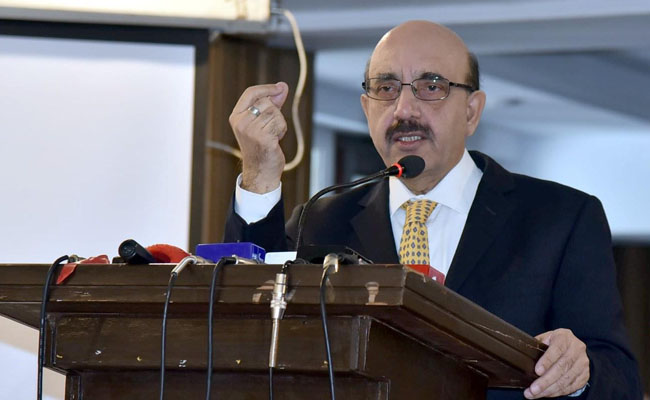MUZAFFARABAD, May 25: The Azad Jammu and Kashmir President, Sardar Masood has urged the universities and research institutions to explore responses to catastrophes directly impinging on food security in the post-Covid-19 period.
“The universities specialising in agriculture should recommend the ways and means to mitigate the impacts of food inflation,” he asserted.
In his opening remarks at a webinar on “Food Security Challenges during Covid-19” organised by the University of Poonch, Rawalakot on Tuesday, he expressed his hope that the impacts of food inflation, especially of wheat flour, sugar, fresh milk, eggs, and other staple items in the low-income population of rural and urban would be mitigated.
While stressing the needed to create a durable interface between health and food systems, real-time authentic data generation, and a further improvement in governance, he said that a multi-departmental Preparedness and Response Strategy to be implemented in collaboration with the private sector and civil society must be hammered out.
Expressing concern over the huge pressures put by the Covid-19 pandemic on both health and food systems, President Masood Khan said the food prices have risen by 38 percent across the globe while the price of wheat, which is a staple in Pakistan, had increased by 28 percent.
“By and large, food supply in Azad Kashmir has been smooth because of the decisions taken by the governments of Pakistan and AJK,” he said adding that most of Azad Kashmir’s food supplies – wheat, flour, sugar, pulses, vegetables, and fruits come from Pakistan.
He said that despite relief programmers, citizens have gone through periods of economic hardship that linger on. During strict lockdown after the first wave of the pandemic, the governments of Pakistan and Azad Kashmir, philanthropists, and charity organisations had stepped forward to supply essential food items to the families of daily wagers and seasonal workers while hoarding and price gouging by retailers, especially of wheat and sugar, were effectively monitored and penalised.
Sardar Masood Khan said that the governance to deal with the pandemic has saved hundreds of thousands of lives in Pakistan and Azad Kashmir. The State president remarked that throughout this pandemic, coronavirus patients have relied heavily on herbs and spices, in addition to allopathic prescriptions, to treat their disease. Researchers through clinical trials can establish the medicinal value of herbs that are collected mostly by herders and nomads in Azad Kashmir.
“It would be also worthwhile to seek informed opinion of agronomists about the cumulative effect of the current or projected pandemics on fragile economies so that remedial measures could be taken beforehand. As we know from experience, febrile activity following an outbreak contributes to uncertainty and panic,” he asserted.
The President said that the overarching objective of our government and academia is to enhance the food security of Azad Kashmir and Pakistan and make our agricultural sector sustainable for meeting future challenges. Timely actions, he maintained, have been taken to avert a national food and nutrition emergency.
“Let’s take collective mitigation actions, in cooperation with the international actors and institutions, to keep our health and food systems functional,” President Khan concluded
